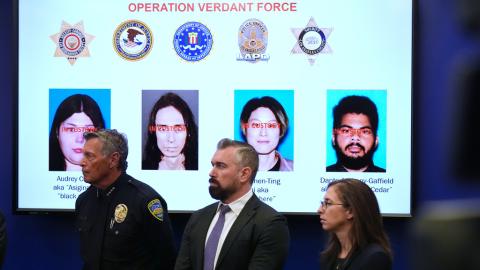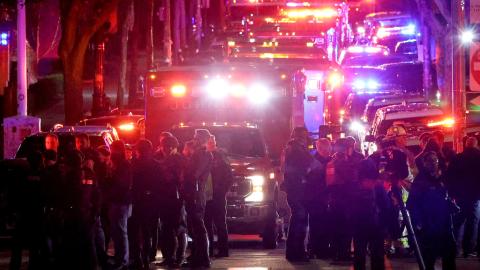Famous Gospel Artist Shares the Secret He Hid from the Church
WASHINGTON -- Each week, the youthful voices of the Howard Gospel Choir fill the halls of the historic Andrew Rankin Chapel.
The venue, which sits prominently on the main quadrangle of Howard University, boasts an impressive list of visitors by American greats like Frederick Douglass, Eleanor Roosevelt, Martin Luther King, Jr., and John F. Kennedy.
It also serves as the choir's rehearsal space, where they put into practice the biblical directive found in the book of Psalms: to make a joyful noise unto the Lord -- singing, clapping, and rocking, for example, to a reimagined, up-tempo version of the classic hymn "Great Is Thy Faithfulness."
He's a gospel music legend whose music connects with both young and the old. John Jessup explains the 'magic' behind the music of Richard Smallwood:
Today its members serve as ambassadors of the university, performing around the world and offering a mix of soulful musicality with a ministry devoted to being "salt and light" wherever they go.
When Gospel Was a No-No
Yet several decades ago gospel music was deemed an unwelcomed genre by the faculty of the music department. During the 1960s and 1970s, a music major who was caught playing anything outside the catalogue of classical composers could be suspended.
"Gospel music was a no-no," recalled Richard Smallwood, a Grammy Award-winning gospel artist, a 1971 graduate of Howard University and one of the choir's founding members.
"We knew how to switch from the latest gospel song to [Johann Sebastian] Bach in three seconds flat!" he laughed. "If somebody said, 'Here comes the dean,' we'd go right from whatever we were playing to Bach or [Frédéric] Chopin until he passed the door. And then we'd go right on back to our gospel."
A Life-Long Love of Music
Smallwood, considered a living legend in black gospel music, has been performing on the world stage for decades. His love of music developed while he was still in diapers and in a crib.
"My mother tells the story that before I could talk … when I could come home from church on Sunday mornings, I would hum whatever hymn they sang at church," Smallwood told CBN News. "So when I was two, [my parents] brought me a toy baby grand piano, and I would bang rhythms on the piano and hum."
His stepfather was a Baptist preacher who played the piano.
"By the time I was 7, I was playing for his church," Smallwood recalled.
But it was his mother, Mabel R. Smallwood, who helped him develop an ear for all kinds of music -- exposing him to everything from classical to jazz to opera to show tunes and a variety of artists like Ella Fitzgerald, Peggy Lee, Rachmaninoff, and the Roberta Martin Singers.
"I was growing up this little kid with all these crazy tastes," he told CBN News.
From a small kids' choir, which he to this day affectionately refers to as the "Baby Smallwood Singers," to his current ensemble, "Vision," Smallwood has earned multiple Grammy nominations, Dove Awards, Stellar Awards, and a spot in the Gospel Music Hall of Fame.
He has collaborated with the likes of Chaka Khan, Quincy Jones, and Aretha Franklin. He also teamed up with Bill and Gloria Gaither to write "Jesus, You're the Center of My Joy." And Whitney Houston showcased one of his songs, "I Love the Lord," in the 1996 remake of a Christmas classic, "The Preacher's Wife."
In September 2015, his popular anthem "Total Praise" was performed for Pope Francis during a White House reception hosted by President Barack Obama. It was a moment he describes as amazing.
The maestro's songs are sung the world over -- instantly recognizable by the distinctive "Smallwood sound," which can be described as a heavenly blend of soaring melodies expressed through the genre of traditional gospel music and infused with his years of classical training.
Dark Night of the Soul
Still, with all the acclaim and success, Smallwood, an ordained minister, stunned fans last year when he revealed that his signature sound often came from a place of pain.
"It got to the point where I couldn't get out of bed, I wouldn't get in the shower," Smallwood told CBN News. "The only time I would sort of go out is if we had somewhere to sing."
He's written and composed volumes of songs and produced around 20 albums. So how did depression affect the creative process for Richard Smallwood? His answer may surprise you. Watch below:
In the living room of his suburban Maryland home on the outskirts of Washington, D.C., he told CBN's John Jessup that he started dealing with depression when he was around 30 years old.
The feeling of being overwhelmed increased after a series of tragedies that landed him in what he described as a "deep, dark well." Those included the deaths of several close friends and learning in his adult years that the man he called "dad" from childhood was not his biological father.
"All of that was going on at the same time, and I just had to talk to somebody," he explained.
He approached a minister from his church, who was also a licensed clinical psychologist.
"After seeing me a while she said, 'Richard, you're 100 percent clinically depressed,'" Smallwood recalled.
The talks helped, but he remained in the dark hole.
"I had to get on medication, which was a major decision for me because I was afraid," he said. "I heard so many horror stories. But it wasn't getting any better."
Hurting in Secret
Ironically, the same man who encouraged concertgoers with lyrics like "There's healing for your sorrow / healing for your soul" says he felt like a fraud since those very words left him feeling unchanged.
"They're coming up to me saying, 'Your song saved me from this' or 'Your song ministered to me,' and I'd go off the stage and go back to the hotel, close the door and I'm hurting," Smallwood explained.
The pain intensified as he desperately tried to keep it hidden from everyone.
"It's such a stigma. You're ashamed," he said. "I think, certainly, the Church doesn't talk about it. And, certainly, my culture doesn't talk about it. So it was sort of a double kind of thing. I didn't want anybody to know."
If you have high blood pressure you go to the doctor. If you have a toothache you go to the dentist. So, why do far fewer seek help to treat mental illness? Watch the conversation gospel recording artist Richard Smallwood is starting about the Church and depression.
The Church's 'Dirty Little Secret'
Within the Christian community depression has been called one of the Church's "dirty little secrets" because the topic is considered taboo and often fraught with misconceptions and religious cultural barriers.
But it's a serious mental illness that does not discriminate, affecting people both outside and inside the Church.
"Certainly having a relationship with Christ, where we understand our identity in Christ, can really deal with and correct some of the thinking errors that we have," Dr. Christine Buckingham, a licensed clinical professional counselor, explained. "But it doesn't make anyone immune, and we can look in Scripture and see many cases of depression."
Dr. Christine Buckingham shared more insights on depression and how and why the Church needs to address this mental illness. Watch below:
Buckingham runs a multi-site private practice, Life Christian Counseling Network, with offices in Virginia, Maryland, and Washington, D.C. She believes churches and pastors should work to overcome those barriers and help their congregations by openly discussing and preaching about mental illness.
She commends high-profile Christians -- like Smallwood and former 700 Club host Sheila Walsh -- for openly sharing their battles with depression.
**For more information on overcoming depression, click here. Also, another helpful resource is New Life Ministries.
"When someone can stand up there and say 'This is what my struggle is. This is who I am' … it can really de-mythologize what the process is," Buckingham observed. "It can also encourage them because they can see that there's a good outcome."
Smallwood has been off medication for at least seven years and still sees his therapist from time to time for what he calls "tune-ups."
He credits his recovery to prayer and counseling.
Sharing His Story with Others
After completing a compilation project entitled "Anthology" last year, Smallwood has turned his attention to writing his autobiography, in which he plans to discuss depression in detail.
He says several friends and fans have already thanked him for his transparency, which, in turn, opened the door for some of them to address their own struggles with mental illness.
"I had no idea just sharing my story would encourage others," he said.
He hopes publishing his memoir will help many more potentially hiding their private battles with depression.
"When they see someone who has been 'successful' in some kind of way talk about the stuff they had to get through to get to that point, that encourages them to say, 'Well, if they can make it, I can.'"




